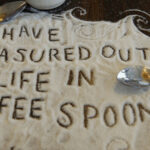
The Love Songs of J. Brown Yogi
September 7, 2016
“So Now What?” A brief composite of convos with yoga teachers after #WAWADIA? workshops
September 25, 2016Last summer the intersection at the bottom of our street was ripped up for repairs. I waited in our bougie car for the traffic cop to signal me through. My partner was in the passenger seat and our two and a half year old son was in the back, in his car seat.
The officer made a hand signal I couldn’t understand. When I didn’t do what he was asking, he pointed at me and started yelling at the top of his lungs. His face went red and he was spitting. He was a big burly white guy, like me.
I had an instant bodily reaction, familiar from being bullied as a child and preteen by men in other uniforms who looked like him, and from teenage violence in which I lashed out, sometimes to defend myself and others, sometimes to exact blind revenge on my peers for the sins of men who looked like that cop. The feeling is a shock wave of rising heat, a flood of cortisol and endorphins I can feel singeing the roots of my hair.
It’s the biochemistry of both patriarchy and the revolt against it. It’s exhilarating to the extent that you’re pretty sure things will turn out all right.
In a blur I finally understood his instruction, crossed the intersection as he directed, but then stopped at the far curb and threw the car into park and unsnapped my belt. I heard my partner trying to reason with me from a distance. I forgot about my child altogether, and opened the door, regressing to about fifteen years old.
I walked hard and fast at the officer, inflating myself with menace, pointing my finger, yelling “Stop bullying people” and “You have no right” and “You’re a public employee” and who knows what else. He looked impassive, settled back on his heels, and kept his thumbs hooked into his bulletproof vest. I came within five feet of him and then felt the acid dissipate as I saw my face in his mirrored aviators. I stopped, registered the détente, and wandered back to the car in a daze. The door-open chime warning brought the world back into focus.
Coming down from it over the next few hours was oddly pleasurable. My backache was gone. For the rest of the afternoon I had the luxury of self-analyzing, connecting the dots of history and feeling that led to the outburst. I had the luxury of weighing the ethics of my rage against the afterglow of its emotional discharge. I could hold and cuddle my son thoughtfully on a park bench and chat calmly with my partner, who’d never seen this side of me before – it doesn’t come up that often in our middle-class environs – about why I can go from zero to a hundred in an instant.
We were able to chat under the maple trees because I wasn’t in custody and I hadn’t been tasered or shot. I had a conflict with a cop and I was able to turn it into therapy.
I forgot all about this until recently, when it became clear again how many times I’ve cheated danger or even death with my whiteness.
But beyond the obvious crisis points — a heavy penny dropped deeper to show me how white supremacy grants me daily doses of emotional and somatic freedom. The traumatized control in the voice of Diamond Reynolds as she watched Philando Castile die and protected her daughter and her own life walks a line between survival and perseverance I will never feel in my body. It’s the voice of hypervigilant dignity, rehearsed for generations of never being allowed to lose it, not even when your lover is executed beside you, of bottling in the terror of an entire culture and history, even as more is being poured in, minute by minute.
How has she learned that voice? Through how many incidents, from listening to how many relatives, and going back how far in memory? What was I taught with equal gravity? Did I ever need to learn the specific speech rhythms and intonations that others rely on to stay alive? My brain and breath formed around such different sounds. What does it mean to say that we’re all created equal? What part of us is unformed by inequality?
I am an unconscious racist in the sense that in the course of living my normal life, “just doing my job”, I can delegate the work of really holding and surviving the violence of patriarchy to women and people of colour. While others are holding and surviving it, I get to do ongoing therapy to expunge its personal effects, almost in the moment. I can regularly congratulate myself on the strides I make towards a private equanimity. I have the luxury of the time that lets me push back against my dissociative defences.
I have time to heal, because time equals space and most spaces are safe for me.
As a white progressive, I can also use my responses to patriarchal violence as a stimulus to progressive growth. But it’s not through my inner goodness that I can see a bigger picture. It’s through feminism and movements like BLM. It’s because of women and people of colour speaking with searing clarity about their lives that I can recognize my entire bodily equilibrium and things as intimate as posture and the ability to hold eye contact (a side-benefit of the white male gaze) is epigenetically inextricable from privilege.
Every personal narrative flowing from patriarchy is in some way about not feeling safe in the body. But my story evaporates in social relevance where it really matters. Regardless of what I’ve been through, I feel safe enough to show my rage at a perceived slight from a police officer. I can show my son – not without pride – the fleeting dignity of acting unrepressed. I can fearlessly use a cop for catharsis, to cleanse my nervous system from wounds that are decades old. I can indulge the punkrock joy of saying “Fuck the police” within their earshot. I can feel what I need to feel and, because it’s been felt, shrug, take a deep breath, and get on with my life.
Like many white people struggling to understand allyship, I’ve learned as much as I can over the past few years – mostly because of BLM actions and the resources they spread around – about what real change demands in terms of self-perception and socio-political action. I’m slightly more aware of structural privilege. I’m a little sharper with my language. I’ve studied the five-points posts and the checklists. I’ve studied up on the stats on anti-Black oppression. I’ve crushed hard on Ta-Nehisi Coates: his life and work feels so much more important than mine. The argument for slavery reparations is a no-brainer.
The ideas have become clear enough that when BLM shuts down the Toronto Pride parade for a half-hour to re-radicalize what has become a such a bourgeois affair that our prime minister can photobomb it while selling arms to Saudi Arabia, I know without question it’s the right thing for them to do, and that I’ll support their demand that Pride nixes the police float next year. They’re saying: cops don’t get photo ops with marginalized communities as if they share the burdens of violence until they do a lot more work. And they’re right.
But this political/conceptual education isn’t enough to really get under the skin. It’s like trying to feel ecologically clean because you recycle egg cartons and stress over voting Democrat or Green. It’s dutiful, but it’s not enough in a burning world.
It’s not enough because I enjoy a deep comfort in my body that isn’t mine as much as it’s been stolen for my benefit. This is not a theory. It’s the felt freedom to walk where I will and drive with a busted taillight and roll my eyes when I see the flashing lights behind me. And even – when I was younger – to catch myself sneering a little inside, as I know many white progressives do, at the artless life choices that led this chump to police academy. I was so unconscious of all this that I could look down on cops because they were obviously there to serve me. It makes sense, given that policing has historical roots in protecting privilege.
White supremacy says: “You can pull me over, and when you let me go with a warning, maybe we’ll nod at each other in silent acknowledgement of what your main job is.”
I have two white sons now who will grow up with this basic bodily comfort, probably with less violence than I’ve known, but in a universe apart from the constant violence others bear. I’ll never have to have “The Talk” with them that I’m ashamed to say I’ve only recently learned Black parents have to have with their sons about how to stay alive. I watch some people talk about the Talk, and hear an intimacy forged in family relations, rooted in an existential threat.
What Talk will I have with my two beautiful sons? What Talk will go beyond making them and I feel better about how we vote and post about our white progressive cred? What Talk will not distract them with the indulgence of guilt, and help them feel their basic, even boring okayness, which all children should feel, with such wonderment and surprise that they ache to extend it outwards?
How can I turn the intellectual case for equality into a somatic urge? How can I nurture a reflex to make space, rather than take it up – which is what I learned to do under the belief that injustices could mainly be solved through personal triumph instead of grinding structural change?
My sons have already inherited incalculable material advantages. I can show them this factually with education, and present the moral argument that they are obliged to share what they have, somehow. Maybe they won’t reject it if I’m not too preachy.
How can I show them that the embodied confidence they are already mirroring in me is a resource and not a right? What poetry, what music, what sport will show this and share this?
If I am breathing freely, they are already breathing freely. The real capital of whiteness is felt in the bone as totally natural. How can I make this unnatural, unequal inheritance contingent on them sharing it? What can I give them that when they meet the daughter of Diamond Reynolds or anyone like her, they instinctively — without any of the resistance I have felt — pour their hearts out into the reparations that begin with silent listening?